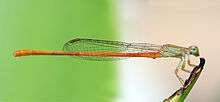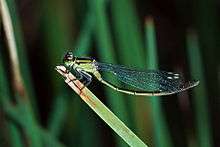Coenagrionidae
The insect family Coenagrionidae is placed in the order Odonata and the suborder Zygoptera.[2] The Zygoptera are the damselflies, which although less known than the dragonflies, are no less common. More than 1,300 species are in this family, making it the largest damselfly family. The family Coenagrionidae has six subfamilies: Agriocnemidinae, Argiinae, Coenagrioninae, Ischnurinae, Leptobasinae, and Pseudagrioninae.[3]
| Coenagrionidae | |
|---|---|
 | |
| Male Ceriagrion glabrum | |
| Scientific classification | |
| Kingdom: | Animalia |
| Phylum: | Arthropoda |
| Class: | Insecta |
| Order: | Odonata |
| Suborder: | Zygoptera |
| Superfamily: | Coenagrionoidea |
| Family: | Coenagrionidae Kirby, 1890[1] |
| Diversity | |
| at least 110 genera | |
This family is referred to as the narrow-winged damselflies or the pond damselflies.[4] The Coenagrionidae enjoy a worldwide distribution, and are among the most common of damselfly families. This family has the smallest of damselfly species. More than 110 genera of the family Coenagrionidae are currently accepted.[5][3]
Etymology
The name may be derived from Greek coen meaning shared or common and agrio meaning fields or wild.
Characteristics
.jpg)
- Usually have a black pattern
- Ground color may be green, blue, yellow, orange, or purple
- Narrow, stalked, usually colorless and clear wings
- Two antenodal cross veins
- Vein M3 arising nearer to nodus than arculus
Adults are seen around various habitats including ponds and wetlands. The females lay their eggs among living or dead submerged vegetation, and in some species, even crawl about underwater depositing their eggs. The nymphs are usually found in debris or among living or dead submerged plant material.[6]
Genera

-_Male_W_IMG_3835.jpg)

_W_IMG_0876.jpg)
These genera belong to the family Coenagrionidae:[7][8][3]
- Acanthagrion Selys, 1876
- Acanthallagma Williamson & Williamson, 1924
- Aceratobasis Kennedy, 1920
- Aciagrion Selys, 1891
- Aeolagrion Williamson, 1917
- Africallagma Kennedy, 1920
- Agriocnemis Selys, 1877
- Amazoneura Machado, 2004
- Amphiagrion Selys, 1876 (red damsels)
- Amphiallagma Kennedy, 1920
- Amphicnemis Selys, 1863
- Andinagrion Bulla, 1973
- Angelagrion Lencioni, 2008
- Anisagrion Selys, 1876
- Anomisma McLachlan, 1877
- Antiagrion Ris, 1904
- Apanisagrion Kennedy, 1920
- Archibasis Kirby, 1890
- Argentagrion Fraser, 1948
- Argia Rambur, 1842 (dancers)
- Argiocnemis Selys, 1877
- Austroagrion Tillyard, 1913
- Austroallagma Lieftinck, 1953
- Austrocnemis Tillyard, 1913
- Austrocoenagrion Kennedy, 1920
- Austrotepuibasis Machado & Lencioni, 2011
- Azuragrion May, 2002
- Bromeliagrion De Marmels, 2005
- Caliagrion Tillyard, 1913
- Calvertagrion St. Quentin, 1960
- Ceriagrion Selys, 1876
- Chromagrion Needham, 1903 (aurora damsels)
- Coenagriocnemis Fraser, 1949
- Coenagrion Kirby, 1890 (Eurasian bluets)
- Coryphagrion Morton, 1924
- Cyanallagma Kennedy, 1920
- Denticulobasis Machado, 2009
- Diceratobasis Kennedy, 1920
- Dolonagrion Garrison & von Ellenrieder, 2008
- Drepanoneura von Ellenrieder & Garrison, 2008
- Enacantha Donnelly & Alayo, 1966
- Enallagma Charpentier, 1840 (American bluets)
- Epipleoneura Williamson, 1915
- Epipotoneura Williamson, 1915
- Erythromma Charpentier, 1840
- Fluminagrion Anjos-Santos, Lozano & Costa, 2013
- Forcepsioneura Lencioni, 1999
- Franciscagrion Machado & Bedê, 2016
- Franciscobasis Machado & Bedê, 2016
- Hesperagrion Calvert, 1902 (painted damsels)
- Hivaagrion Hämäläinen & Marinov, 2014
- Homeoura Kennedy, 1920
- Huosoma Guan, Dumont, Yu, Han & Vierstraete, 2013
- Hylaeonympha Rácenis, 1968
- Idioneura Selys, 1860
- Inpabasis Santos, 1961
- Ischnura Charpentier, 1840 (forktails)
- Junix Rácenis, 1968
- Lamproneura De Marmels, 2003
- Leptagrion Selys, 1876
- Leptobasis Selys, 1877 (swamp damsels)
- Leptocnemis Selys, 1886
- Leucobasis Rácenis, 1959
- Luzonobasis Villanueva, 2012
- Mecistogaster Rambur, 1842
- Megalagrion McLachlan, 1883
- Megaloprepus Rambur, 1842
- Melanesobasis Donnelly, 1984
- Mesamphiagrion Kennedy, 1920
- Mesoleptobasis Sjöstedt, 1918
- Metaleptobasis Calvert, 1907
- Microstigma Rambur, 1842
- Millotagrion Fraser, 1953
- Minagrion Santos, 1965
- Mortonagrion Fraser, 1920
- Nehalennia Selys, 1850 (sprites)
- Neoerythromma Kennedy, 1920 (yellowfaces)
- Neoneura Selys, 1860 (robust threadtails)
- Nesobasis Selys, 1891
- Oreiallagma von Ellenrieder & Garrison, 2008
- Oreocnemis Pinhey, 1971
- Oxyagrion Selys, 1876
- Oxyallagma Kennedy, 1920
- Pacificagrion Fraser, 1926
- Pandanobasis Villanueva, 2012
- Papuagrion Ris, 1913
- Paracercion Weekers & Dumont, 2004
- Pericnemis Selys, 1863
- Peristicta Hagen in Selys, 1860
- Phasmoneura Williamson, 1916
- Phoenicagrion von Ellenrieder, 2008
- Pinheyagrion May, 2002
- Plagulibasis Lieftinck, 1949
- Platystigma Kennedy, 1920
- Proischnura Kennedy, 1920
- Proneura Selys, 1889
- Protallagma Kennedy, 1920
- Protoneura Selys in Sagra, 1857
- Psaironeura Williamson, 1915
- Pseudagrion Selys, 1876
- Pseudostigma Selys, 1860
- Pyrrhosoma Charpentier, 1840
- Roppaneura Santos, 1966
- Sangabasis Villanueva, 2012
- Schistolobos von Ellenrieder & Garrison, 2008
- Stenagrion Laidlaw, 1915
- Teinobasis Kirby, 1890
- Telagrion Selys, 1876
- Telebasis Selys, 1865 (firetails)
- Tepuibasis De Marmels, 2007
- Thaumatagrion Lieftinck, 1932
- Tigriagrion Calvert, 1909
- Tuberculobasis Machado, 2009
- Tukanobasis Machado, 2009
- Vanuatubasis Ober & Staniczek, 2009
- Xanthagrion Selys, 1876
- Xanthocnemis Tillyard, 1913
- Xiphiagrion Selys, 1876
- Zoniagrion Kennedy, 1920
References
- Kirby, W.F. (1890). A Synonymic Catalogue of Neuroptera Odonata, or Dragonflies. With an Appendix of fossil species. London: Gurney & Jackson. pp. 202 [148]. doi:10.5962/bhl.title.5534.
- Dijkstra, K.D.B.; et al. (2013). "The classification and diversity of dragonflies and damselflies (Odonata). In: Zhang, Z.-Q. (Ed.) Animal Biodiversity: An Outline of Higher-level Classification and Survey of Taxonomic Richness (Addenda 2013)". Zootaxa. 3703 (1): 36–45. doi:10.11646/zootaxa.3703.1.9. hdl:10072/61365.
- "World Odonata List". Slater Museum of Natural History, University of Puget Sound. 2018. Retrieved 2019-05-19.
- Borror, D.J.; White, R.E. (1970). A Field Guide to Insects. Boston: Houghton Mifflin Company. ISBN 0-395-91171-0.
- Integrated Taxonomic Information System (2007). Coenagrionidae, retrieved November 4, 2007.
- John L. Capinera (2008). Encyclopedia of Entomology. Springer Science & Business Media. pp. 1244–1245. ISBN 978-1-4020-6242-1.
- Dijkstra, Klaas‐Douwe B.; Kalkman, Vincent J.; Dow, Rory A.; Stokvis, Frank R.; et al. (2014). "Redefining the damselfly families: a comprehensive molecular phylogeny of Zygoptera (Odonata)". Systematic Entomology. 39: 68–96. doi:10.1111/syen.12035.
- "Odonata Central". Retrieved 2019-05-19.
External links
- Info and Photos at BugGuide
- Images from Georgia, US

